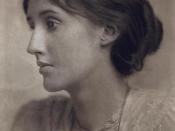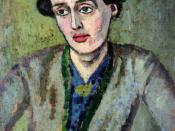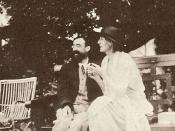The Modernist movement was concerned with the accelerating pace of society toward destruction and meaninglessness. In the late 1800s many of society's certainties were undermined. Marx demonstrated that social class was created, not inherent; Freud boiled down human individuality to an animalistic sex drive; Darwin provided evidence that the Bible might not be literally true; and Nietzsche argued that even the most deeply-held ethical principles were simply constructions. Modernist writers attempted to come to terms with where humanity stood after its cornerstones had been pulverized. The movement sifted through the shards of the past looking for what was valuable and what could inspire construction of a new society.
A common motif in Modernist fiction is that of an alienated individual--a dysfunctional individual trying in vain to make sense of a predominantly urban and fragmented society. In Romanticism language was transformative: the reader was transported by the poem. In Modernism language was formative: the reader was not transported anywhere.
This first episode of Ulysses demonstrates the typical qualities of a modernist text in that the readers are offered no introductions or exposition of the characters or place. Further difficulties arise for the first-time readers as it becomes clear that there are no explanations or obvious links from one action, speech or thought process to the next. But it is soon discovered that this disjointed narrative does eventually progress into some type of resolution. Stephen gives Mulligan the key to the tower as this is repeated later when Bloom also leaves his house without a key. Another connection with Bloom arises when he thinks of Mulligan as a usurper. This concept of betrayal is re-worked later when Bloom worries about his wife's affair with Boylan. Further to these points, the anti-semitism, which Haines reveals, also sets the scene for Bloom's entrance as...


